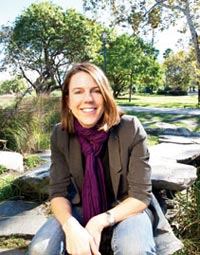RECENT COLUMNS
• The Spirit of Innovation
Let’s hope that as technology continues to advance and we come out of this recession, the pool and spa industry will regain some of the passion and enthusiasm that was prevalent in its early years.
• What Are You Afraid Of?
In studies of gays and lesbians, most say their purchasing decisions are influenced by whether a company supports their community. That might not matter if they weren’t such excellent potential spa buyers. But they are.
• “No”
Maybe if our “No” is loud enough, we can create the changes needed to turn it into a “Yes.”
When I was young, being a journalist was considered honorable. The profession carried images of smart, highly principled reporters working tirelessly to expose corruption and keep the public informed.
On a less idealistic but equally important note, there were many reporters who wrote on a smaller scale, perhaps at local papers. These professionals saw themselves as servants of their community, and rather than rake up controversy where none existed, their role was to bring news to readers in an unbiased way.
But whether you were with The New York Times or Small Farm Today, old-school journalists were trained and vetted. There were hard, fast standards that the industry subscribed to, and deviating from those ideals was considered unethical.
Today, the great equalizing force of the Internet combined with a profound lowering of values has caused the field of journalism to lose its nobility. To my mind, most of the people creating today’s media content sit slightly above ambulance-chasing lawyers and slightly below cryptosporidium.
I remember reading the series of “investigative” stories in the Chicago Tribune that ultimately led to the drain cover recall last summer. The level of bias and omission of important facts made me feel embarrassed to serve in the same profession as that reporter.
In writing this column, I Googled “hot tubs” and immediately found another example of sloppy reporting on an ABC affiliate. The story stated that bacteria found in shower heads had been linked to a disease called non-tuberculous mycobacterium complex, and implied that hot tubs could be involved as well. The reporter cautioned viewers to “avoid them.” Yet there was no evidence that the illness was connected to spas, no scientist was involved with the story, no statistics were provided about the disease (other than that it’s “rare”) and no manufacturer, or even an expert, on these allegedly dangerous products was quoted. The bar on that story was set so low that we are literally standing on it.
Last week, an article that appeared in Pool & Spa News was picked up by another magazine, reworded and published using the byline of one of their writers. We were not cited as the original source of the story, which is bad enough, but this publication even used one of our sources’ quotes without checking with her, and in their paraphrasing of her statement subsequently got a fact wrong.
The editorial staff of Pool & Spa News are certainly not saints, and we’ve made our share of mistakes. However, we hold ourselves accountable to the old-fashioned standards of reporting unbiased truth and not stealing content from others.
Our industry has suffered greatly from the effects of substandard journalism. And because of this, I have made it a habit to contact media outlets when they misreport facts involving pools and spas, and encourage you to do the same. When it comes to any story regarding a topic that I am not familiar with, I now look at every “fact” with deep skepticism.




